 In the Shadow of the Fall (Guardians of the Gods, #1) by Tobi Ogundiran
In the Shadow of the Fall (Guardians of the Gods, #1) by Tobi Ogundiran Format: eARC
Source: supplied by publisher via Edelweiss
Formats available: hardcover, ebook, audiobook
Genres: epic fantasy, fantasy
Series: Guardians of the Gods #1
Pages: 160
Published by Tordotcom on July 23, 2024
Purchasing Info: Author's Website, Publisher's Website, Amazon, Barnes & Noble, Kobo, Bookshop.org, Better World Books
Goodreads
A cosmic war reignites and the fate of the orisha lie in the hands of an untried acolyte in this first entry of a new epic fantasy novella duology by Tobi Ogundiran, for fans of N. K. Jemisin and Suyi Davies Okungbowa.
" The novella of the year has arrived!" ―Mark Oshiro, #1 New York Times bestselling author
Ashâke is an acolyte in the temple of Ifa, yearning for the day she is made a priest and sent out into the world to serve the orisha. But of all the acolytes, she is the only one the orisha refuse to speak to. For years she has watched from the sidelines as peer after peer passes her by and ascends to full priesthood.
Desperate, Ashâke attempts to summon and trap an orisha―any orisha. Instead, she experiences a vision so terrible it draws the attention of a powerful enemy sect and thrusts Ashâke into the center of a centuries-old war that will shatter the very foundations of her world.
My Review:
It’s not really a surprise that the story begins with Ashâke defying all the rules she’s lived by for her entire life. It’s more of a surprise that she’s been stewing for FIVE whole years about it.
Because something is clearly, maybe not rotten but certainly wrong, in the temple of Ifa that Ashâke has dedicated her life to. She should have been raised from acolyte to priest five years ago. She should have heard the orisha speak to her.
It may sound contradictory that she should have expected the gods to speak to her, but, well, they’re generally not that picky. They’ve spoken to EVERYONE else who has made it that far, EXCEPT Ashâke. Her inability to progress is notable and entirely too noticeable.
That the priests who rule the temple can neither explain her lack nor do something about the rising levels of bullying and abuse that Ashâke has suffered, as increasing numbers of her juniors pass her over for promotion, is the kind of problem that many people would feel compelled to rectify, sooner or later.
Unfortunately, now that Ashâke has disobeyed all the rules and learned much – but not all – of the things she was not supposed to ever discover, she’s only made things a whole lot worse. Not just for herself, but for everyone at the temple.
And for everyone she touches. Along with, quite possibly, the whole, entire world.
Escape Rating B: I generally love novellas for the way that they tell a complete story in a non-doorstoppy length. Tordotcom usually does an excellent job of producing novellas that are exactly the length they’re meant to be and don’t feel like too much got left out in the editing to make a word count that isn’t right for the story being told. Howsomever, In the Shadow of the Fall is the exception to that rule. It’s more of an interesting start to a story than the actual story.
This is intended to be the first half of a duology, and it shows a bit too much. I felt like I got half a book rather than a complete novella that has revealed plenty but has more to come. The ending of In the Shadow of the Fall, with its drumbeat of lie after lie being revealed and Ashâke’s bitter need to adjust her entire worldview, wasn’t so much a cliffhanger as running headlong off the whole entire cliff.
Where this reader is left in a heap on the horns of a HUGE dilemma, in that I was absolutely fascinated by the story that I got, up until it came to a screeching halt.
I’m saying that and I generally love stories where the twist is as unexpected as this one is and the truth – no matter how painful – sets the protagonist free to make a new course and right the wrongs they’ve finally been apprised of.
 Something which I’m sure is intended to happen in the second book in the duology, At the Fount of Creation, which is not coming out until JANUARY – making the situation doubly frustrating for the reader. Or at least for this reader.
Something which I’m sure is intended to happen in the second book in the duology, At the Fount of Creation, which is not coming out until JANUARY – making the situation doubly frustrating for the reader. Or at least for this reader.
I hoped I’d feel better about the whole thing once the second book was announced – which has turned out to be true. But I must confess that I finally have an eARC which I will be reading ASAP, because I NEED TO KNOW what happens to Ashâke and her world.
As I said, the ending of In the Shadow of the Fall wasn’t so much of a cliffhanger as it was running headlong off the cliff and/or slamming headfirst into that cliff’s base. A painful and sudden stop. My personal recommendation would be to save yourself that frustration and wait to read the entire duology in one go as soon as you can grab copies of both books in January.
Because this first book is a real gut-punch of a story – it honestly HURTS not to know how it’s all going to work out. And based on the first half, once we do find out in At the Fount of Creation – it’s going to be grand and heartbreaking in equal, glorious measure.

 To Gaze Upon Wicked Gods (Gods Beyond the Skies, #1) by
To Gaze Upon Wicked Gods (Gods Beyond the Skies, #1) by 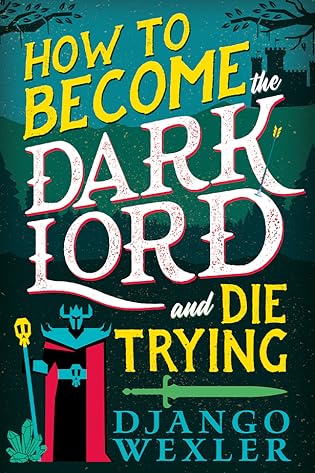 How to Become the Dark Lord and Die Trying (Dark Lord Davi, #1) by
How to Become the Dark Lord and Die Trying (Dark Lord Davi, #1) by  Because it’s not
Because it’s not 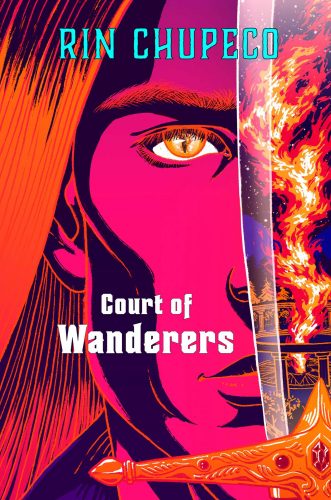 Court of Wanderers (Silver Under Nightfall, #2) by
Court of Wanderers (Silver Under Nightfall, #2) by 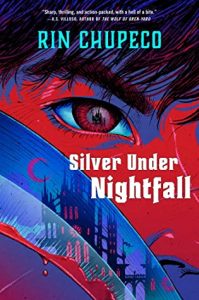 Escape Rating A++: The SQUEE is strong with this review. Let’s get into at least a bit of the why of that fact.
Escape Rating A++: The SQUEE is strong with this review. Let’s get into at least a bit of the why of that fact.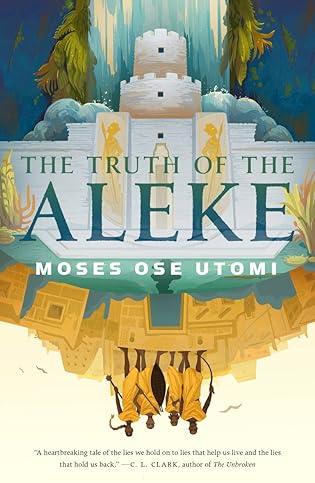 The Truth of the Aleke (Forever Desert, #2) by
The Truth of the Aleke (Forever Desert, #2) by 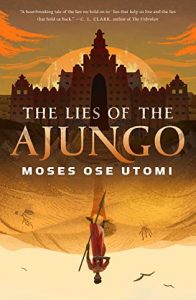 Escape Rating A+: Read
Escape Rating A+: Read 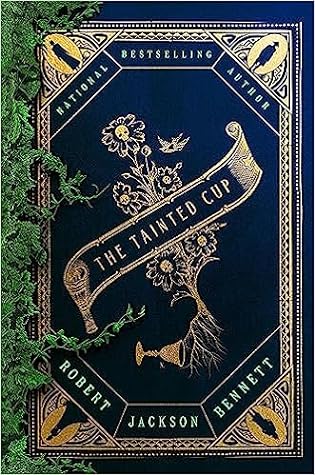 The Tainted Cup (Shadow of the Leviathan, #1) by
The Tainted Cup (Shadow of the Leviathan, #1) by 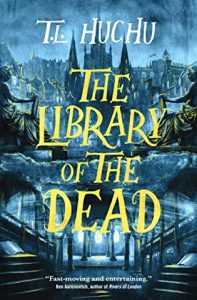 Escape Rating A+: There’s been a rise in science fiction mysteries in the last couple of years, with books like Mur Lafferty’s
Escape Rating A+: There’s been a rise in science fiction mysteries in the last couple of years, with books like Mur Lafferty’s 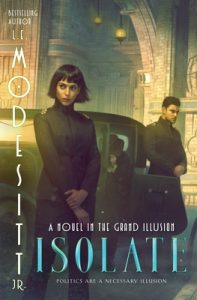 But the setting of The Tainted Cup, and the epically FUBAR political situation therein, is very much fantasy of both the grimdark and steampunk varieties. The world, with its mixture of science and magic and scientifically based magic is similar to the setting of L.E. Modesitt’s
But the setting of The Tainted Cup, and the epically FUBAR political situation therein, is very much fantasy of both the grimdark and steampunk varieties. The world, with its mixture of science and magic and scientifically based magic is similar to the setting of L.E. Modesitt’s  Demon Daughter (Penric and Desdemona #12) by
Demon Daughter (Penric and Desdemona #12) by 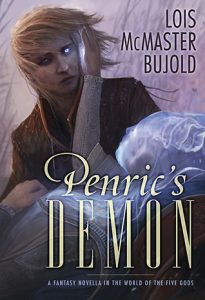 Demon Daughter – not Demon’s Daughter because that would be a different genre altogether – is a delightfully cozy entry in the
Demon Daughter – not Demon’s Daughter because that would be a different genre altogether – is a delightfully cozy entry in the  Which is exactly what happens in Demon Daughter, in a roundabout sort of way. The chaos at least.
Which is exactly what happens in Demon Daughter, in a roundabout sort of way. The chaos at least. Escape Rating A: This twelfth entry in the
Escape Rating A: This twelfth entry in the 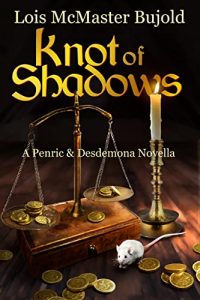 It’s those questions that stick in my mind after finishing Demon Daughter. Because there are entirely too many people in the real world who face that dilemma every day while trying to live their truth even though they’ve been taught by family, faith and community that their truth is a lie.
It’s those questions that stick in my mind after finishing Demon Daughter. Because there are entirely too many people in the real world who face that dilemma every day while trying to live their truth even though they’ve been taught by family, faith and community that their truth is a lie.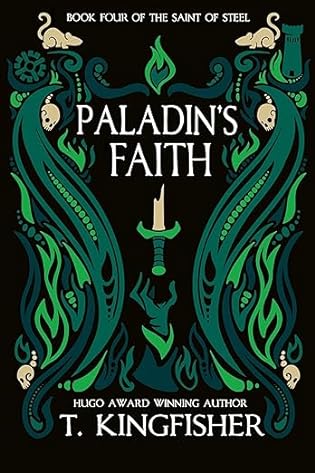 Paladin's Faith (The Saint of Steel, #4) by
Paladin's Faith (The Saint of Steel, #4) by 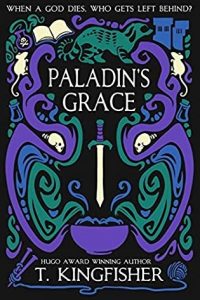 There’s a classic saying about large organizations at cross-purposes within themselves, that the right-hand doesn’t know what the left hand is doing. Marguerite Florian’s problem with the Red Sail mercantile empire is that their “right hand does not know who the left is killing”.
There’s a classic saying about large organizations at cross-purposes within themselves, that the right-hand doesn’t know what the left hand is doing. Marguerite Florian’s problem with the Red Sail mercantile empire is that their “right hand does not know who the left is killing”.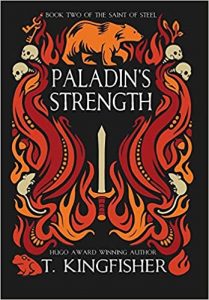 Marguerite just has to stay alive long enough to find the artificer. For that, she’ll need bodyguards who can’t be bribed or bought, seduced or suborned. She needs a paladin – or two.
Marguerite just has to stay alive long enough to find the artificer. For that, she’ll need bodyguards who can’t be bribed or bought, seduced or suborned. She needs a paladin – or two.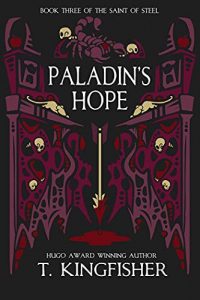 Howsomever, by the nature of that waiting game a LOT of this story is extremely interesting character development with a fair bit of adding to the depth of the worldbuilding but one does, like one of the side characters, Davith, want them to just ‘get on with it’ one way or another, either to get a move on in their mission or just make a move on each other.
Howsomever, by the nature of that waiting game a LOT of this story is extremely interesting character development with a fair bit of adding to the depth of the worldbuilding but one does, like one of the side characters, Davith, want them to just ‘get on with it’ one way or another, either to get a move on in their mission or just make a move on each other.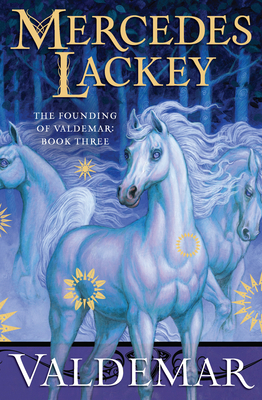 Valdemar (The Founding of Valdemar #3) by
Valdemar (The Founding of Valdemar #3) by  This final book in the
This final book in the 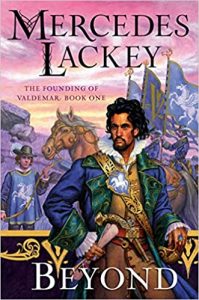 Escape Rating A: Valdemar has always been a bit of an anomaly as far as fantasy worlds go. Most epic fantasies are set at times and in places that are in so much turmoil that that are just no nice places to visit and you really wouldn’t want to live there. There are a few exceptions, like Pern, Celta and Harmony, but for the most part, by the time that an epic fantasy series gets written about a place – or epic space opera or a combination thereof – the situation has gotten so FUBAR that liveability is a long way off even by the series’ end.
Escape Rating A: Valdemar has always been a bit of an anomaly as far as fantasy worlds go. Most epic fantasies are set at times and in places that are in so much turmoil that that are just no nice places to visit and you really wouldn’t want to live there. There are a few exceptions, like Pern, Celta and Harmony, but for the most part, by the time that an epic fantasy series gets written about a place – or epic space opera or a combination thereof – the situation has gotten so FUBAR that liveability is a long way off even by the series’ end.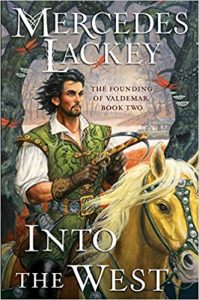 It is generally a two-steps forward, one-step back proposition. We know that sausage is going to be fairly tasty by the time it reaches Queen Selenay in
It is generally a two-steps forward, one-step back proposition. We know that sausage is going to be fairly tasty by the time it reaches Queen Selenay in 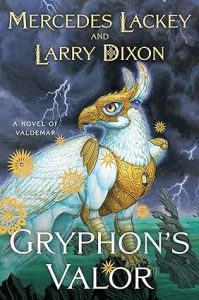 The tributes to Sydney-You-Asshole’s death were many and heartfelt, particularly deeply touching to the heart of any reader who has a beloved companion animal that is gone. There is still dust in this review as I write about it – so be prepared.
The tributes to Sydney-You-Asshole’s death were many and heartfelt, particularly deeply touching to the heart of any reader who has a beloved companion animal that is gone. There is still dust in this review as I write about it – so be prepared. Shards of Glass by
Shards of Glass by  Shards of Glass is a bit of a side story in the marvelously interwoven, intricately-plotted, and long-running
Shards of Glass is a bit of a side story in the marvelously interwoven, intricately-plotted, and long-running 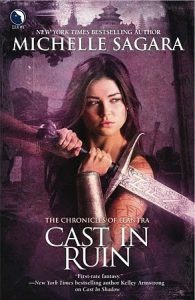 Escape Rating A+: I began reading the
Escape Rating A+: I began reading the 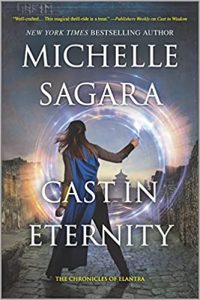 And of course they all turn out to be wrong – and wrong in a way that is buried in the legends of the deep past and will cause catastrophic destruction if they’re not sussed out in time and by the right people.
And of course they all turn out to be wrong – and wrong in a way that is buried in the legends of the deep past and will cause catastrophic destruction if they’re not sussed out in time and by the right people.